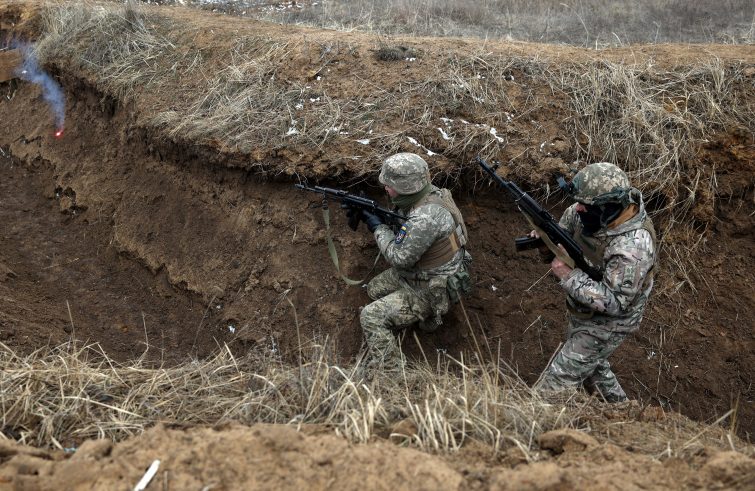
(from Mukachevo) “The biggest problem is that we were not prepared for a large-scale war. It has been over two years now. That’s a long time. There have been countless casualties. Countless people have died. We are exhausted.” She asked to remain anonymous and not to be photographed. She is the wife of a soldier on the front line. They are both doctors. SIR met her in a café in Mukachevo. She told us about life in the trenches, the condition of the soldiers and the reports coming in from prisoners of war. She says her husband calls her every day. He did so again yesterday. “He said they are all fine, they are all alive and well,” she said. “We hope that nothing will happen to them. Yesterday was a very hard day. There was a lot of shooting. But the situation is calmer today.
She is terrified every time the phone rings.
Once, while she was on the phone, a bomb exploded a few metres from her husband. On another occasion, her husband did not call her for eight days. “It was terrible, I thought he was dead. I kept hoping and praying.”
Many have died, she says. Even here in Mukachevo, in the westernmost part of the country, the hospitals are at full capacity. But the psychological trauma is just as worrying. “They are exhausted. They can hardly survive all this time under such pressure. Now the war is being fought with drones, which makes it harder for soldiers to hide because the drones can identify army positions.” The soldiers alternate between living “underground”, in the trenches, when they are on active duty at the front, and living in the barracks. This has been the life of her husband since the first day of the war. As a doctor, he treats wounds.
Most of the wounds are caused by bombs and landmines. This means loss of limbs – arms and legs – and intracranial injuries.
In addition to the physical suffering, there is also psychological trauma. She explains: “When a person is in a trench for 24 hours twice a week, they are under tremendous stress. And on top of the precarious conditions, they have drones flying over their heads, which makes it even more frightening. The soldiers range in age from 25 to 30, 40 and 50. And sadly, there is no possibility of rotation into and out of the front lines. The battalions are also dwindling in numbers. For example, her husband came home, but only to return the body of a dead soldier to his family and then stayed overnight. “He prefers not to talk about what’s happening at the front because he doesn’t want to upset me. He keeps telling me that he does everything he can to ensure that nobody dies of injuries sustained in combat.
But it’s hard to survive. Because of the constant shelling in some combat zones, it is impossible to reach the fallen soldiers. So they simply die, on the ground, alone, on the battlefield, from their own wounds.
In fact, very little is known about the soldiers who are prisoners of war. There is a certain reluctance to talk about this subject. But those who have returned from captivity report harsh conditions. “A young woman I know, who has a small child, hadn’t heard from her husband for eight months,” she says. “He had been taken to Russia. Until a soldier returning home told her that her husband was with him and that he was still alive. He also told her to be content with his being alive and that it was better not to know anything else. The truth about his actual condition would have hurt her too much.”
The doctor’s wife also has a sad thought for the Russian soldiers deployed on the same battlefield. “There are so many Russian soldiers lying dead on the ground. So many of them, it is an expanse.” Those who have been captured are told: “Call your families, tell them not to come, tell them that if they come here they will die here. They will be killed. “They enlisted, but they didn’t know where they were being sent. When they are caught, they tremble with fear.
In addition, many corpses of Russian soldiers have not been buried. Mothers who don’t know what became of their sons and husbands. The Russians know what is happening here, but there is nothing they can say or do.
I am convinced that not all Russians are cruel. They are all young men, all very young. This war is a testament to what the human mind is capable of: bombing millions of people, killing fellow human beings. Why are they doing this? There is so much suffering. So much pain.”









